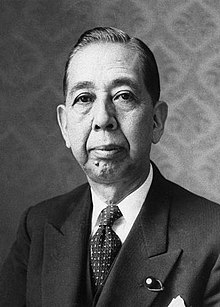
Back نوبوسوكه كيشي Arabic Нобусуке Киши Bulgarian Nobusuke Kishi Bislama নোবুসুকে কিশি Bengali/Bangla Nobusuke Kiši Czech Nobusuke Kishi Welsh Kishi Nobusuke German Nobusuke Kishi Spanish Nobusuke Kishi Basque نوبوسوکه کیشی Persian
Nobusuke Kishi | |
|---|---|
岸 信介 | |
 Official portrait, 1957 | |
| Prime Minister of Japan | |
| In office 31 January 1957 – 19 July 1960 | |
| Monarch | Hirohito |
| Deputy | |
| Preceded by | Tanzan Ishibashi |
| Succeeded by | Hayato Ikeda |
| Director-General of the Japan Defense Agency | |
| In office 31 January 1957 – 2 February 1957 | |
| Prime Minister | Tanzan Ishibashi |
| Preceded by | Tanzan Ishibashi |
| Succeeded by | Akira Kodaki |
| Minister for Foreign Affairs | |
| In office 23 December 1956 – 10 July 1957 | |
| Prime Minister |
|
| Preceded by | Mamoru Shigemitsu |
| Succeeded by | Aiichirō Fujiyama |
| Minister of State without Portfolio | |
| In office 8 October 1943 – 22 July 1944 | |
| Prime Minister | Hideki Tōjō |
| Preceded by | Position established |
| Succeeded by | Position abolished |
| Minister of Commerce and Industry | |
| In office 18 October 1941 – 8 October 1943 | |
| Prime Minister | Hideki Tōjō |
| Preceded by | Seizō Sakonji |
| Succeeded by | Hideki Tōjō |
| Member of the House of Representatives for Yamaguchi 1st District | |
| In office 1 May 1942 – 8 October 1943 | |
| In office 20 April 1953 – 7 September 1979 | |
| Personal details | |
| Born | 13 November 1896 Yamaguchi, Yamaguchi Prefecture, Empire of Japan |
| Died | 7 August 1987 (aged 90) Tokyo, Japan |
| Political party | Liberal Democratic Party (1955–1987) |
| Other political affiliations |
|
| Spouse | |
| Children |
|
| Parent(s) | Hidesuke Satō Moyo Satō |
| Relatives |
|
| Alma mater | Tokyo Imperial University |
| Signature |  |
Nobusuke Kishi (岸 信介, Kishi Nobusuke, 13 November 1896 – 7 August 1987) was a Japanese bureaucrat and politician who was prime minister of Japan from 1957 to 1960.
Known for his exploitative rule of the Japanese puppet state of Manchukuo in Northeast China in the 1930s, Kishi was nicknamed the "Monster of the Shōwa era" (昭和の妖怪; Shōwa no yōkai).[1] Kishi later served in the wartime cabinet of Prime Minister Hideki Tōjō as Minister of Commerce and Vice Minister of Munitions,[2] and co-signed the declaration of war against the United States on December 7, 1941.
After World War II, Kishi was imprisoned for three years as a suspected Class A war criminal. However, the U.S. government did not charge, try, or convict him, and eventually released him as they considered Kishi to be the best man to lead a post-war Japan in a pro-American direction. With U.S. support, he went on to consolidate the Japanese conservative camp against perceived threats from the Japan Socialist Party in the 1950s. Kishi was instrumental in the formation of the powerful Liberal Democratic Party (LDP) through a merger of smaller conservative parties in 1955, and thus is credited with being a key player in the initiation of the "1955 System", the extended period during which the LDP was the overwhelmingly dominant political party in Japan.[3][4]
As prime minister, Kishi's mishandling of the 1960 revision of the U.S.-Japan Security Treaty led to the massive 1960 Anpo protests, which were the largest protests in Japan's modern history and which forced him to resign in disgrace.[5]
His younger brother, Eisaku Satō, also was a prime minister. Kishi was the maternal grandfather of Shinzo Abe, twice prime minister, and defense minister Nobuo Kishi.[6]
- ^ 岩見隆夫 (2012). 昭和の妖怪岸信介. 中央公論新社. ISBN 978-4122057234. The author Takao Iwami (under his pseudonym 田尻育三) originally used the nickname "Monster of Manchuria" in "Monster of Manchuria: A Study on Kishi Nobusuke," a piece he wrote for the magazine Bungei Shunjū (「満州の妖怪―岸信介研究」『文藝春秋』1977年11月号) and another piece for the same magazine the following year entitled "A Study on Kishi Nobusuke: The Postwar Period" (「岸信介研究—戦後編」『文藝春秋』1978年7月号), but when he subsequently published the two together in book form in 1979, he entitled it "Monster of Shōwa". Both phrases are inventions that can be traced back to Iwami and were not used by Kishi's contemporaries during his career. Of the two, the nickname that is actually used today is "Monster of Shōwa".
- ^ Kapur 2018, p. 25.
- ^ Kapur 2018, p. 10.
- ^ Samuels 2001.
- ^ Kapur 2018, pp. 17–34.
- ^ Levidis, Andrew (2022-07-01). "The end of the Kishi era". East Asia Forum Quarterly: Volume 14, Number 3, 2022. 14 (3): 38–39.
© MMXXIII Rich X Search. We shall prevail. All rights reserved. Rich X Search